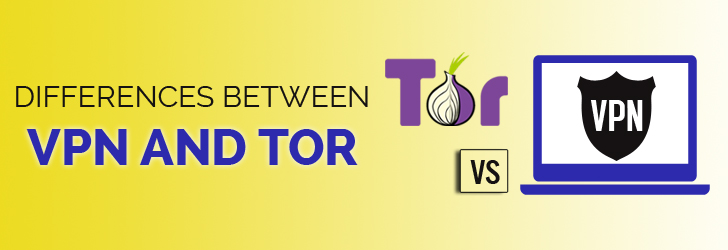
When we speak about online privacy, we constantly make references to the VPN. VPN stands for Virtual Private Network and completely secures traffic by using point-to-point encryption. VPN maintains anonymity by hiding your IP address. However, the VPN provider would be able to know your real IP address as they are the ones who will mask your real IP with a virtual IP.
Based on most VPN providers' privacy policy, they do not keep user logs and hence ensure your privacy and anonymity are maintained. Assuming that VPN providers keep their promises, VPN truly provides anonymity as no one outside of the VPN network will know about your identity.
Like VPN, Tor has a key role in maintaining anonymity. Tor stands for The Onion Router. Though at first glance they look similar, VPN and Tor work differently.
How does a VPN work?
VPN is a private network virtually built over public network (i.e. the Internet). To use a VPN, you need a VPN client installed on your device. There are third-party VPNs that are free to use. However, free VPNs usually have limited bandwidth and offers less secure protocols.
The VPN servers are available across geographically distributed locations, wherein you can choose any server location to initiate traffic. A VPN encrypts all your traffic and keeps it untraceable by acting as a black box between the origin and you. Hence a destination website can only see the IP address of the VPN server, not you. As a result, you can browse websites anonymously.
Some countries ban VPN, and hence use of a VPN is not legal in certain countries. People also use VPN for working around Internet Censorship.
A few VPN advantages are:
- Most VPNs do not throttle bandwidth and provide speed almost similar to open Internet.
- Maintains privacy and anonymity
- Improves security with strong encryption
- Suitable for P2P file sharing
- Allows to bypass geographical restrictions (Censorship)
A few VPN disadvantages are:
- VPN provider can view user activities. User must trust the VPN provider.
- Good VPN services are expensive.
- VPN laws differ in different geographical regions.
How does Tor work?
Tor primarily maintains the anonymity of traffic. It is a free, and open-source service. The complete Tor network constitutes more than 7K relays. These relays are used effectively to transmit traffic. Traffic over Tor is completely anonymous and is untraceable for any traffic analysis.
Tor maintains user privacy and allows users to access the Internet unmonitored. This keeps the complete traffic confidential. While the destination website does not identify your traffic, it still can find out if Tor is being used and restrict it. Some websites, such as Wikipedia restrict page edits for Tor users. Similar to VPN, traffic using Tor is encrypted.
Tor has multiple layer encryption and encrypts data as well as IP address. Traffic over Tor is sent across multiple relays that are chosen randomly before reaching the destination. While hopping between multiple relays, each relay decrypts to check the next relay address. This is similar to the layers of an onion and hence the name The Onion Router (Tor). The final relay will decrypt and sends the data to the destination without having any information about the source.
Such multiple layers of encryption make the Tor network secure and free from any network surveillance. This was originally developed by the US Navy.
A few Tor advantages are:
- Tor keeps traffic untraceable owing to multiple encrypted hops across relays.
- Works over a distributed network
- Easy to set up and use Tor browser
- Tor is a free and open-source project
A few Tor disadvantages are:
- Slower due to multiple layers of encryption
- Not suitable for P2P transfer
- Tor has been susceptible to security attacks over the browser. To avoid this, you would need an updated version of Tor.
When to use a VPN or Tor?
VPN and Tor function differently, though both are used for increased privacy and security. However, for file sharing, downloading a large file or browsing the internet you can simply use a VPN. So long as you choose the right VPN service that does not maintain logs, you can still ensure anonymity and privacy. VPN is also relatively faster as compared to Tor.
Tor slows your connection and is not a suitable choice for P2P sharing. If privacy and security are the only concern, you may choose Tor for anonymity while browsing the web. In case you want to browse onion sites or dark web, then Tor gives you an additional layer of privacy protection. Such websites are not listed by Google but there are other search engines that index them. A lot of law enforcement agencies use Tor to get leads about criminal activities. In case you want to get access to such heavily restricted websites over the dark web, then you need to use Tor. Tor makes it difficult to trace back the source.
Share this post
Leave a comment
All comments are moderated. Spammy and bot submitted comments are deleted. Please submit the comments that are helpful to others, and we'll approve your comments. A comment that includes outbound link will only be approved if the content is relevant to the topic, and has some value to our readers.

Comments (0)
No comment